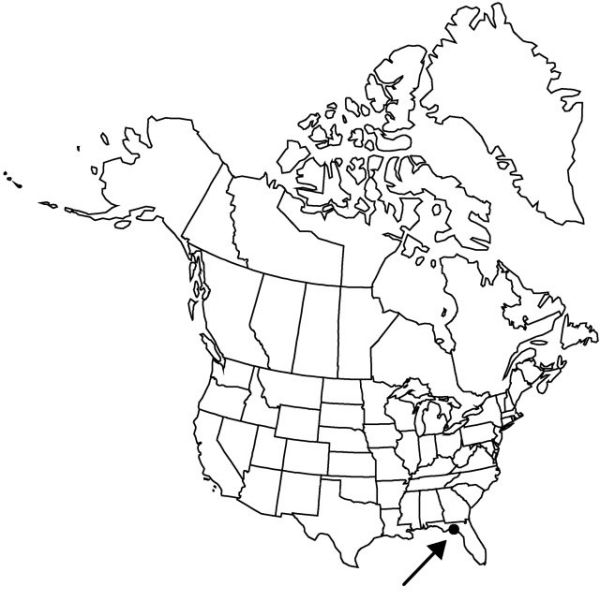Hymenocallis godfreyi
Novon 4: 396. 1994.
Bulb basally rhizomatous, ovoid, 3–4.5 × 2.5–3.5 cm; basal plate 1.5–2 cm; neck 2–3 cm; tunic grayish brown. Leaves deciduous, 3–6, nearly erect, (1.3–)2–3.8 dm × 1–2.5 cm, coriaceous; blade yellowish green, liguliform, channeled proximally, apex obtuse to subacute. Scape 2–3 dm, 2-edged, glaucous; scape bracts 2, enclosing buds, 4–5 × 1–1.5 cm; subtending floral bracts 3.5–5 cm × 5–10 mm. Flowers 2, one opening slightly before the other, fragrant; perianth tube green, 4.5–7.5(–8.5) cm; tepals slightly ascending, white, distal green-striped on keel, 7–10.5 cm × 5–8 mm; corona white with small, yellowish green eye, broadly funnelform, shortly tubulose proximally, 3–4.5 × 5 cm, margins between free portions of filaments erect, with 2 prominent lacerate projections; free portions of filaments inserted on flat depression, slightly incurved, white, 1.5–3 cm; anthers 1.2–1.5 cm, pollen golden; ovary oblong to slightly pyriform, 1.5–2 cm × 10 mm, ovules 4–6 per locule; style green in distal 1/2, fading to white proximally, 13–17 cm. Capsules subglobose, ca. 3.5 × 2.5 cm. Seeds obovoid, 2–2.5 × 1.3–1.8 cm. 2n = 48.
Phenology: Flowering early–mid spring.
Habitat: Brackish marshes
Elevation: 0 m
Discussion
Of conservation concern.
Hymenocallis godfreyi is endemic to the marsh area near Ft. San Marcos de Apalache along the St. Mark’s River. It is somewhat abundant locally, but because of its highly restricted range it should be recommended for conservation. G. L. Smith and M. Darst (1994) have proposed a relationship to H. rotata, from which it likely evolved. It is distinguished from that species by its short scape, short, erect coriaceous, yellowish green leaves, broadly funnelform staminal corona with prominent lacerate projections, and unique basal rhizome.
Selected References
None.
